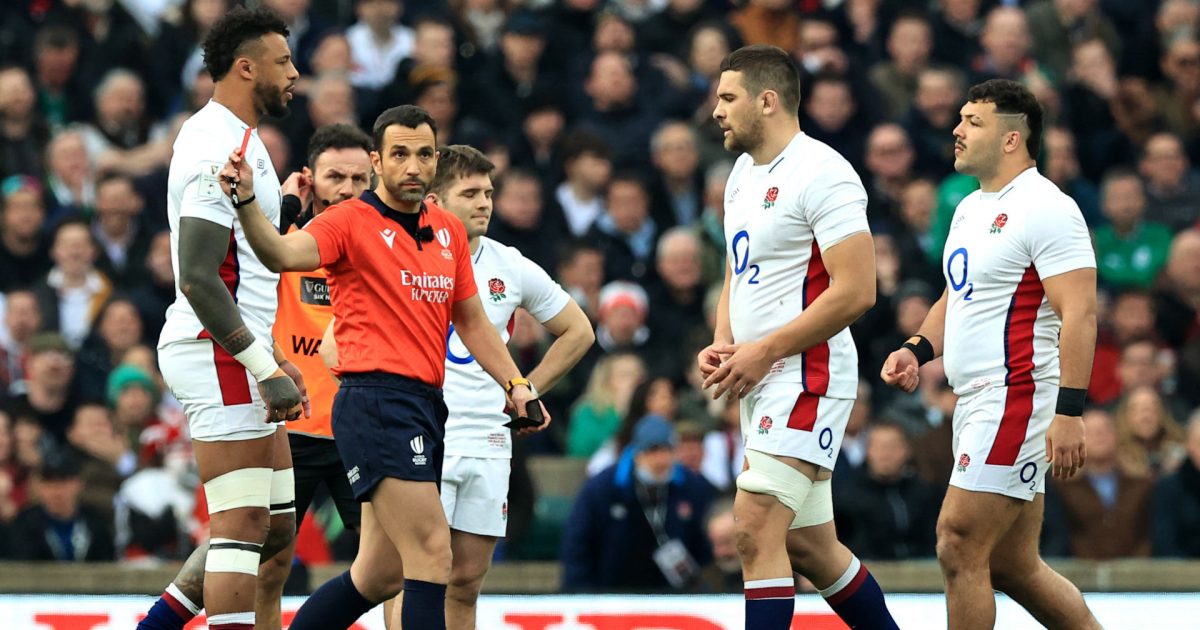Ex-Ireland player makes 'good sign' Six Nations red card prediction

Former Ireland back-rower Alan Quinlan believes it would be a good sign to see red cards shown in the upcoming Guinness Six Nations, claiming that World Rugby are correct to stick with his zero-tolerance approach to eliminate headshots from the game. Safety has become a buzzword in recent times, an emphasis evident in the increased number of players sent off in the championship in recent years.
Between 2000 and 2019, only six red cards were seen in the Six Nations but that number has ballooned with nine shown in the past three seasons – two in 2022, five in 2021 and two more in 2020.
England’s Charlie Ewels and Italy’s Hame Faiva were red-carded last year, Scotland’s Finn Russell and Zander Fagerson, France’s Paul Willemse and Ireland’s Peter O’Mahony and Bundee Aki all saw red in 2021, while England’s Manu Tuilagi and France’s Mohamed Haouas were given their marching orders in 2020.
There has been commentary that these red cards are ruining the sport as a spectacle. For instance, England had to play with 14 men for practically an entire game after Ewels was dispatched just 82 seconds into his team’s March 2022 loss to Ireland while in the previous round, the action in Dublin was reduced to uncontested scrums after sub Italian hooker Faiva was red-carded in the first half shortly after he came on as an injury replacement.
Quinlan, though, claimed that he admires the way World Rugby have refused to budge in its approach and he would have no problem with the upcoming matches witnessing some more red cards given how player safety is now of utmost importance.
'We are not talking that we need the place of Italy or Wales. We don’t need that. We need more good games'
It's a miracle Levan Maisashvili is alive. He tells @heagneyl ??? he's now desperate for @GeorgianRugby to get more games ahead of the #RWC2023 https://t.co/5nbZqEsJQ3
— RugbyPass (@RugbyPass) January 29, 2023
Speaking on the Newstalk Hard Shoulder programme ahead of this weekend’s Six Nations round one games featuring Wales-Ireland, England-Scotland and Italy-France, the ex-Ireland forward said: “Of course, there is concern about the concussions and head knocks and all that but World Rugby have been strong in the last number of years in trying to really stick to their guns in the sense that there is zero tolerance around some of the headshots.
“There is a lot of stuff you see in southern hemisphere games and the Rugby Championship if somebody gets sent off for a head-on-head clash where you say, ‘Well, it is just a rugby collision’. You get some of that in the southern hemisphere.
“I have always been speaking openly about this and saying players’ behaviours and body positions have to change and I just don’t know if the coaches are really implementing this. Defence coaches, it’s all about get up, smash them, get in their faces, tag the ball, don’t allow offloads. The behaviours have to change.
“Are we going to see red cards in the Six Nations? Probably. I think there is not a weekend that goes by. For me, that is a good sign that we are not backing away, World Rugby aren’t backing away and saying, ‘Oh god, let’s determine these incidents as accidental and start giving yellow cards’.
“Players know now that if you fly into a ruck with a shoulder tucked and your arm not at least out trying to bind on somebody, you are in a dangerous position. Shooting out of the line, I saw an incident with Richie Arnold. Munster played Toulouse two weeks ago and he shoots out of the line.
“Of course the enthusiasm, the energy as a big forward, you want to try and get at the opposition out-half, but he put himself in a position where he is really risking a red card situation. One or two inches higher and Joey Carbery could be seriously injured but also he [Arnold] is a red card. As it turned out he wasn’t cited because it was deemed at the very top end of the chest.
“Some players might argue this, ‘What am I supposed to do?’ Don’t shoot out of the line on your own trying to smash some fella. Then you say, ‘Well, is the game changing? Is that taking the good out of the game?’ No. Referees and the audience watching will understand if there is an accidental collision or if somebody dips a little bit and then they talk about mitigation.
“But I still see some players who are recklessly kind of swinging arms, dipping the shoulder into people. A lot has changed since I played. A lot of this stuff went unnoticed and we have seen from some of the stories about players with early-onset dementia and all that kind of stuff, so we have got to stick to it and keep trying to protect the players.
“I love the physicality of the game. Sometimes it can look really, really physical but when you are out there the adrenaline rush, I love it and the players love it but they have got to be really mindful and find ways and always trying to find ways to improve the game and make it safer.”










































